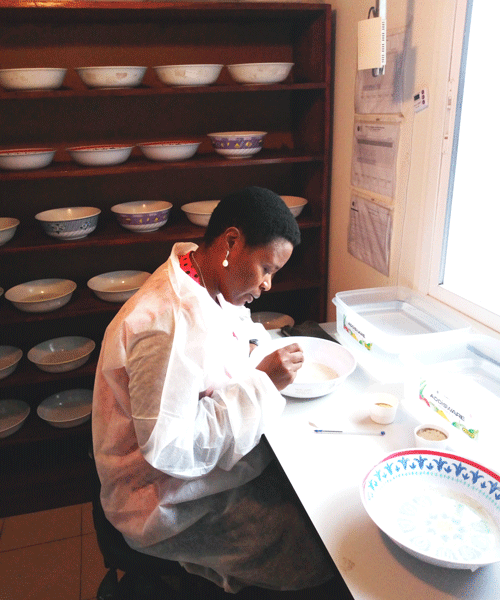Mosquitoes are not simply the cause of sleepless nights for many, pesky as they are with their nagging buzz. They are also the cause of about 219 million cases of malaria per year, and of more than 400,000 deaths, especially among children under the age of five.
Kenya is heavily affected by mosquitoes of the genus Anopheles, which carry and spread the malaria-causing parasite Plasmodium falciparum. According to the US Centers for Disease Control and Prevention, 3,5 million new clinical cases and 10,700 deaths each year are caused by these mosquitoes.
Susan Imbahale, a Medical Entomologist and a Senior Lecturer in the Department of Applied and Technical Biology at the Technical University of Kenya (TU-K), was well aware of their role in the disease transmission and decided to focus her efforts on the management and control of these insects.
And thanks to a TWAS-Swedish International Development Cooperation Agency (Sida) research grant that she has received in 2016, she became a leading specialist in Kenya and a driving force for future generations of Kenyan scientists.
"Doing research that is useful to my community and has an impact on people's lives is heart-warming," said Imbahale. "I have received many research grants, but the TWAS-Sida grant was my booster: we purchased essential instruments for the university laboratories—an optical imaging microscope, an autoclave, a desiccator—which are now shared and contribute to making our scientific community stronger and more competitive in the study of vector-borne diseases." In addition, the grant was instrumental in supporting the work of one of her master students, who was later promoted to senior technologist at TU-K.
Imbahale is now an expert and a focal point for mosquitoes management in Kenya. She is supervising students, is active in outreach programmes aimed at raising awareness among the population, and acts on demand as a consultant. In late 2017, for example, the Somali office of the World Health Organization asked her advice on the implementation of mosquitoes' larval source management. And, in 2018, she taught entomology technicians of the Centro de Investigação em Saúde de Manhiça, in Maputo, Mozambique, how to rear mosquitoes.
As a young girl, Imbahale loved nature and biology at large, which oriented her towards zoology first, and biology of conservation later, to understand the relationships among organisms and the environment. She obtained a BSc in zoology and chemistry in 2002, and an MSc in biology of conservation in 2004, both from the University of Nairobi, along with two promising assignments.
In 2003, she worked as research assistant with the Kenya Wildlife Service, to study large herbivores. From 2003 to 2004, she served as a Junior Assistant in the Nairobi National Park, monitoring and evaluating migratory wildlife through animal counts and data collection.
But, in the end, she did not get the job she wanted and this unfortunate event turned into her stroke of luck. "I started a PhD at the Kenya Medical Research Institute in collaboration with the Wageningen University & Research, in Wageningen, the Netherlands, and this oriented my future career."
After earning her PhD in medical entomology in 2009, she continued studying malaria-causing mosquitoes—Anopheles—and the strategies for their control.
From 2011 to 2015, she was a project manager with the International Centre for Insect Physiology and Ecology (Icipe), in Nairobi, Kenya. Her major tasks were monitoring and controlling mosquitoes’ populations, and raising awareness within the communities and schools living in the Nyabondo district of Kenya.
Previous studies had shown that mosquitoes larvae host parasitic fungi (one is Lagenidium giganteum) inside their body. Hence, Imbahale decided to test whether these fungi were harmless companions for the larvae or, rather, potential killers that scientists could use to prevent their growth.
To this purpose, she carried out demanding field work, visiting regularly mosquitoes wild breeding areas, searching and collecting their larvae. Once in the lab, she grew the larvae in a suitable medium to isolate and identify the fungi living on their tiny bodies, and then she confirmed that the fungi were potential killer of the mosquito larvae.
"We have obtained promising results," she explained "but they are still very preliminary, and cannot be used on a wider scale. Therefore, more tests and data collection are ongoing."
The participation in a TWAS-Sida Research Grant Conference in Dar es Salaam, Tanzania in August 2018, [https://twas.org/article/new-skills-african-science], was another milestone in her career. "The conference gave me the opportunity to meet with other TWAS-Sida grant recipients, and establish connections that are still vital. We still confront and discuss topics of common interest."
Imbahale is now at a point where she may prove her expertise and share her knowledge, teaching university students and passing critical information to the population. In the frame of an outreach project in Nyabondo district, funded by Biovision, she explained to the local community the importance of covering unused cement fish ponds, to avoid mosquitoes’ concentration and proliferation. After this simple information, the area recorded fewer insects and malaria cases.
Now Imbahale has another goal: "I'd like to move ahead in my career. To this purpose, I am even more committed to attracting more students and training them to make them competent scientists. Women are a core value: motivating young female students towards a career in science is mandatory."
This, in turn, as she hopes, will open the door to more funds and collaborations and, possibly, to memoranda of understanding with selected industries that might offer growth opportunities to students.
Cristina Serra

